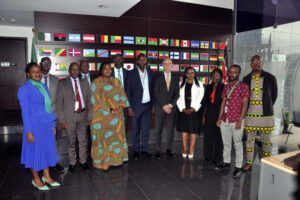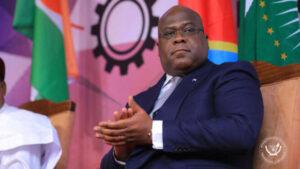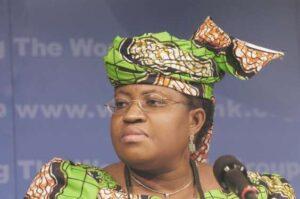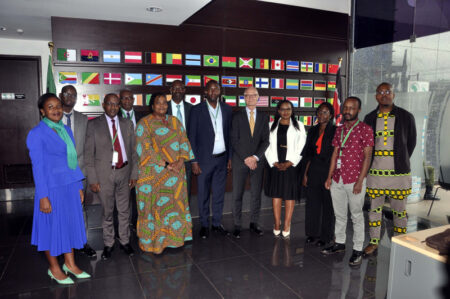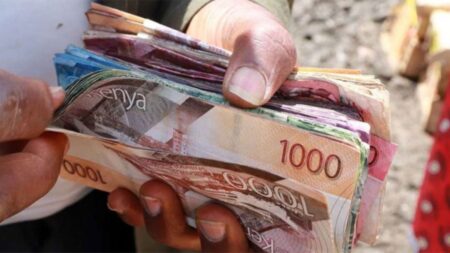- Kenyan Farmers Receive $2M Boost from Africa Fertiliser Financing Mechanism
- Brace for High Interest Rates for a Longer Period World Bank Warns Kenya
- Kenya-Ethiopia Trade Relations: Legislators Advocate for Policy Alignment to Boost Ties
- Visualising the state of debt in Africa 2024
- Abu Dhabi radiates optimism as over 300 startups join AIM Congress 2024
- TLcom Capital Raises $154 million in Funding to Boost Its African Growth
- Africa’s $824Bn debt, resource-backed opaque loans slowing growth — AfDB
- LB Investment brings $1.2 trillion portfolio display to AIM Congress spotlight
Africa
- AfDB asks policymakers to put in place an orderly and predictable way of dealing with Africa’s $824Bn debt pile.
- According to AfDB, Africa’s ballooning external debt reached $824 billion in 2021.
- AfDB president says there is urgent need for increased concessional financing, particularly for low-income countries.
Africa’s immense economic potential is being undermined by non-transparent resource-backed loans that complicate debt resolution and compromise countries’ future growth, African Development Bank (AfDB) President Dr Akinwumi Adesina has said.
Adesina at the Semafor Africa Summit taking place on the sidelines of the International Monetary Fund and World Bank 2024 Spring Meetings, highlighted the challenges posed by Africa’s ballooning external debt, which reached $824 billion in 2021, with countries dedicating 65 per cent of their GDP to servicing these obligations.
He said the continent would pay $74 billion in debt service payments this year alone, a sharp increase from $17 billion in 2010. “I …
- Meg Whitman, US Ambassador to Kenya, highlights key investment opportunities in Kenya, particularly in the creative industry and clean energy.
- She noted that Kenya has the potential to become the Singapore of Africa through vertical business integration, job creation, innovation, and foreign direct investment.
- AmCham Business Summit 2024 seeks to strengthen bilateral trade and investment between the US, Kenya, and East Africa.
The fourth edition of the regional American Chamber of Commerce Kenya (AmCham) Business Summit, has officially kicked off in Nairobi, Kenya, under the theme, ‘Catalyzing The Future of US-East Africa Trade and Investment’.
This year’s forum underscores AmCham Business Summit as the premier platform for strengthening bilateral trade and investment between the United States, Kenya, and East Africa.
Hosted by the American Chamber of Commerce (AmCham), the two-day Summit has brought together delegates from the United States of America, East and Sub-Saharan Africa in efforts to deliberate and …
- UN faults UK-Rwanda asylum treaty citing concerns on potentially harmful impact on global responsibility-sharing, human rights, and refugee protection.
- Spearheaded by Prime Minister Rishi Sunak, the legislation mandates judges to deem Rwanda as a safe third country.
- With deportation flights slated to start in July, the move is sparking weighty debates over the ethical implications of outsourcing asylum responsibilities.
This week’s passage of the “Safety of Rwanda” Bill by the UK Parliament has triggered alarm bells within the United Nations (UN), with two prominent leaders, Filippo Grandi, the UN High Commissioner for Refugees, and Volker Türk, the UN High Commissioner for Human Rights, raising concerns over its potentially harmful impact on global responsibility-sharing, human rights, and refugee protection.
Spearheaded by Prime Minister Rishi Sunak, the legislation mandates judges to deem Rwanda as a safe third country, paving the way for the deportation of thousands of migrants who have sought refuge …
The African Union will run the year 2021 under the theme: Arts, Culture, and Heritage: Levers for Building Africa We Want. The Theme’s focus is on the arts and creative industry’s transformative power.
This is in line with the theme of the United Nations. The year 2021 had been declared by the UN as the year of the creative industry. This comes in recognition of the power of the arts to bring people together and the earning potential within this industry.
The latest African Union summit held on saw a change at the helm of Africa’s coordinating organ. Replacing the South African president as the AU chair, the leader of the Democratic Republic of Congo will take over as the new chair of the African Union.
President Felix Tshisekedi will take the helm of the African Union for the year 2021. His focus will be on the artistic and creative …
Music streaming giant Spotify has announced its official launch in several African countries. Since it launched in Africa in 2018, it has been only available for a few African countries, including South Africa, Egypt, Morocco, Tunisia, and Algeria.
The company has announced that it will be expanding its services to 39 African countries.
Here’s the list of African countries that Spotify will serve ( in alphabetical order)
Angola, Benin, Botswana, Burkina Faso, Burundi, Capo Verde, Cameroon, Chad, Comoros, Djibouti, Equatorial Guinea, Eswatini, Gabon, Gambia, Ghana, Guinea and Guinea Bissau.
Ivory Coast, Kenya, Lesotho, Liberia, Madagascar, Malawi, Mali, Mauritania, Mauritius, Mozambique, Namibia, Nigeria, Nigeria, and Rwanda. Others include Sao Tome and Principe, Senegal, Seychelles, Sierra Leone, Tanzania, Uganda, Zambia, and Zimbabwe.
The company has announced that it will expand its features and tailor its podcast services to fit into the different markets.
Apart from the few countries where Spotify was available, …
Digital news curation is one of the businesses that is doing well in Africa.
With most people in Africa having access to smartphones and other gadgets that can access the internet, there has been a growing urge for news and information.
However, despite the availability of certain information, getting the right content you want can sometimes be a hassle as they tend to be scattered all across the internet.
Digital content curation and players are killing it in Africa, by bringing people the latest and most popular news on different categories.
People are now able to get trending news as well as local and international happenings which they can manually personalize according to their preferences.
Currently, there are three digital news curation companies that are making a killing in Africa.
These are Opera News, Scooper News and Phoenix Browser.
Opera News
Opera News was basically a feature that was incorporated …
The confirmation of Dr. Ngozi Okonjo Iweala as the World Trade Organization’s new head is a positive development. Having previously been blocked by the Trump administration, it is a welcome relief that it has finally come to fruition.
There are questions as to the reasons behind her blockade in the first place. Could it be her nation of origin? Perhaps a discomfort about bringing governance of the world’s largest trade organization to Africa? Or possibly the fact that she is a woman? Perchance some are not ready for female leadership. Judging from how long the US presidency has been a boys-only club, it begs to reason that this might be a plausible reason.
Regardless of the reasoning, Dr. Ngozi Okonjo Iweala’s history precedes her. She is no stranger to breaking barriers, having been appointed as the first female finance minister under two different sitting presidents in Nigeria. She has also …
Iran’s development of economic and trade ties with Africa has been facing some problems.
The problems include lack of planning, lack of recognition and interest by the private sector organizations such as chambers of commerce and trade unions, lack of appropriate infrastructure and lack of government resources and facilities.
As part of its plan to gradually solve the above problems, Iran’s National Development Fund (NDF) has opened a €200 million credit line for the country’s Trade Promotion Organization (TPO).
The credit line will be used for developing exports of commodities and services to African countries.
According to Farzad Piltan, the director-general of TPO’s Office of Arabian and African Countries, the fund has been allocated as part of a $2-billion support package which has been allocated by NDF for developing the country’s non-oil exports.
“The board of directors of the National Development Fund has approved this fund and it has scheduled …
The music industry makes a significant contribution to the economy. The industry has evolved over the years. Back in the day, artists made a sizeable income from selling cassettes or CDs. With the advent of technology came music downloads. Estimates indicate that in 2001, close to 40% of music CDs sold were pirated. There was no noticeable difference between the original and pirated version, except the latter was sold at a much cheaper cost, which drove up music piracy.
Initially, record companies and artists attempted to lobby for more stringent measures on music pirates. Unfortunately, the ability to prosecute lagged far behind the rate of piracy. The stronger copyright laws also alienated the fan base.
It appeared digitization would be the death of music until innovation caught up. The late Steve Jobs developed Apple iTunes that allowed people to pay to download music. With the development of the Torrents protocol, …
